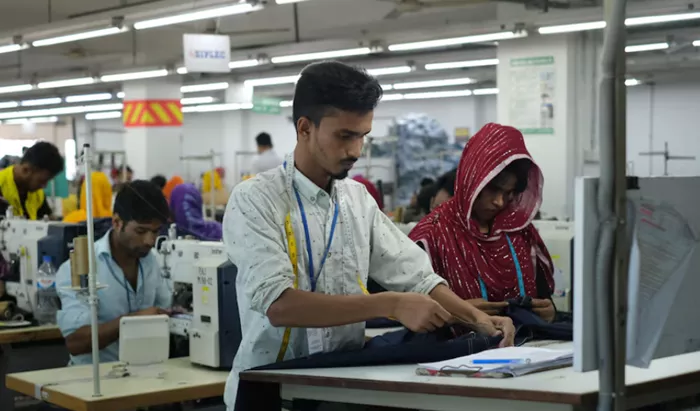In a bustling industrial district on the outskirts of Dhaka, Bangladesh, workers at Padma Satel Arab Fashions continue sewing denim and assembling jeans for popular Australian brands like Millers, Rivers, and Rockmans. However, the future of the factory is now in jeopardy after its Australian parent company, Mosaic Brands, defaulted on $2.5 million in payments to its suppliers.
Mosaic’s decision to enter voluntary administration late last month has had a ripple effect on Bangladesh’s garment sector, which is now grappling with the fallout. An estimated $30 million is owed to more than 23 factories, threatening the livelihoods of thousands of workers, most of whom are women.
“Since June, we’ve repeatedly asked for payment, but they told us their sales were down and promised to pay soon,” said Jabed Ahmed, director of Padma Satel Arab Fashions. “Without the payment from Mosaic, I don’t think we can survive.”
For the factory’s 3,000 workers, the missed payments have created uncertainty. Yasmin Laboni, a 26-year-old worker, expressed concerns about her ability to care for her two children. “Our owner can’t pay us from his pocket. At best, he can keep some of the workers employed,” she said. “This non-payment will affect everyone. It will be hard to pay for medical expenses or even buy clothes.”
Factory manager Mohammad Alam Mia, who earns $450 a month, fears massive layoffs if the debts are not settled. “All we ask is that foreign companies pay on time,” he said.
The situation has led to calls for a full audit of the defaults affecting factories in Bangladesh, India, and China, as workers demand accountability.
Mosaic Brands Faces Financial Crisis
In September, Mosaic Brands announced it would close five of its brands—Rockmans, Autograph, Crossroads, W.Lane, and BeMe—while focusing on others such as Millers and Rivers. CEO Erica Berchtold explained the move as part of a broader strategy to restructure and better serve Australian customers.
“We plan to concentrate on core brands to attract new customers, particularly in regional Australia,” she said.
However, the company filed for administration the following month, citing the need for a reset to ensure future success. The company’s administrators, FTI Consulting, are currently assessing its viability and considering options such as asset sales, restructuring, or liquidation. For overseas suppliers like those in Bangladesh, payments will depend on their position in the creditor hierarchy and the terms of the final plan.
Suppliers Say Business Practices Exacerbated the Crisis
Suppliers in Bangladesh have criticized Mosaic for its business practices, claiming the company pressured them to accept lengthy payment terms and steep discounts. “They made us scale up production and hire more workers, but the payment terms were 120 days—four times the industry standard,” said Ohmar Chowdhury, owner of Hydroxide Knitwear. “We can’t sustain that. This is like criminal fraud.”
Mosaic’s failure to meet its financial obligations has sparked criticism from the Bangladesh Garment Manufacturers and Exporters Association, which argues that the company’s actions set a dangerous precedent for the industry, already struggling from the pandemic’s impact.
“We wrote to the Australian High Commission about Mosaic’s non-payment, but they advised us to seek independent legal advice,” said Mohiuddin Rubel, a former director of the association. “What does this say about Australian standards? Why are they not taking responsibility?”
The situation has raised concerns about double standards, as Bangladeshi factories face intense scrutiny over worker rights, safety, and sustainability, while Australian companies like Mosaic appear to evade accountability.
Oxfam Criticizes ‘Entrenched Exploitation’
Oxfam Australia has condemned the default, highlighting the exploitation that many garment workers in Bangladesh already face. “These workers are paid poverty wages—around $6 a day,” said Sarah Rogan, Oxfam’s advocacy lead. “For Mosaic not to pay for fulfilled orders means workers have essentially worked for free.”
As the financial strain grows, suppliers like Sarwar Hossain, manager of Sultana Sweaters, report that banks are now hesitant to extend loans to struggling factories. “I’ve had to delay wages for months, and I’m nearly $1 million in debt because of Mosaic,” he said. “I’ve thought about ending my life—this situation is unbearable.”
Despite the mounting pressure, Hossain regrets continuing to fulfill orders for Mosaic in hopes that the relationship would improve. “We tried to protect our reputation, but now we are paying the price for their unethical practices.”
Impact Felt Across the Industry
Mosaic’s default has not only hurt individual suppliers but has also triggered broader concerns about the sustainability of Bangladesh’s garment industry, which is the second-largest exporter of ready-made garments in the world. The sector generates $34 billion annually—85% of Bangladesh’s export revenue—and employs around 4 million people.
The failure of one of Australia’s biggest fashion companies to honor its debts has sparked anger among suppliers and workers alike. “Mosaic claims to care about worker welfare, but here they take the goods and don’t pay, facing no repercussions,” said Chowdhury.
Mosaic’s receivers, KPMG, have stated they are working closely with suppliers to stabilize the company’s operations. “Depending on the outcome of the sale of the business, there may be an opportunity to reset trading terms post-receivership,” they said.
Reporting Methodology:
ABC News spoke with several suppliers who shared unpaid orders and detailed their ongoing struggles to secure payment from Mosaic. A freelance reporter in Bangladesh visited factories and interviewed workers on the ground to better understand the human toll of the crisis. Despite repeated attempts to contact Mosaic’s executives and administrators for comment, neither the company nor its representatives responded to requests from ABC News.
Related topics:
- Ariana Grande’s Jaw-Dropping Fashion Journey: From Cat Ears to Custom Couture on the Wicked Press Tour
- Get Ready for a Glamorous Transformation at This Year’s Miami Fashion Week!
- Cameron Brink Nails a Bold Fall Fashion Trend in Gorgeous New Photos

